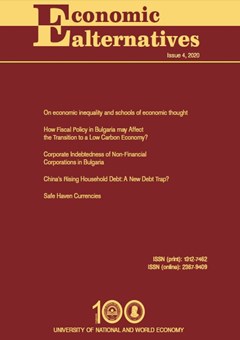How Fiscal Policy in Bulgaria may Affect the Transition to a Low Carbon Economy?
Author: Dimitar Zlatinov
Abstract
The adaptation of traditional macroeconomic policy goals to new ecological realities assigns a specific role to macroeconomic policy. We model the short-run transmission mechanism of fiscal policy under Currency Board Arrangements in Bulgaria in order to assess the fiscal policy potential to boost sustainable economic development and compensate for the economic growth losses due to decarbonisation of the economy. We find that fiscal policy instruments in Bulgaria have no statistically significant effect on GDP components considered separately but they do have a complex effect on macroeconomic environment in the country. This indicates that specific fiscal policy effects to support the transition to a low-carbon economy in Bulgaria cannot be expected and the structural policies should be followed.

